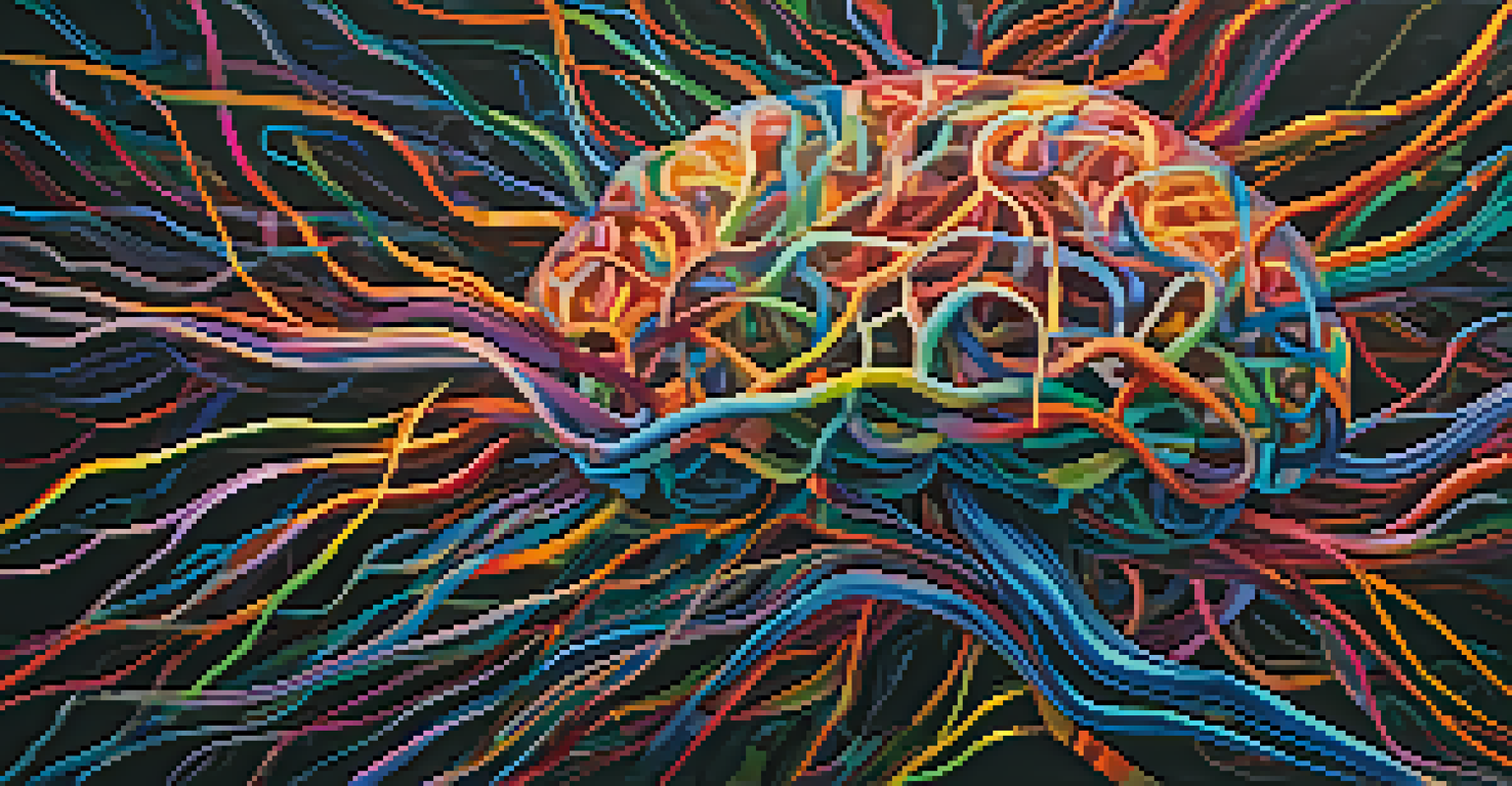Future Directions: Psychedelics and Neuroscience Innovations

The Resurgence of Psychedelics in Modern Medicine
Psychedelics, once relegated to the fringes of society, are making a significant comeback in medical research. This revival is largely due to breakthroughs in our understanding of how these substances interact with the brain. For instance, studies have shown that compounds like psilocybin can have profound effects on mental health, particularly in treating conditions such as depression and PTSD.
The greatest revolution in our generation is the discovery that human beings, by changing the inner attitudes of their minds, can change the outer aspects of their lives.
The shifting perception of psychedelics is not just about their therapeutic potential; it's also about the science backing that potential. Neuroscientists are increasingly utilizing advanced imaging techniques to visualize changes in brain activity after psychedelic use. This allows researchers to pinpoint exactly how these substances can promote neuroplasticity, the brain's ability to reorganize itself by forming new neural connections.
As more clinical trials yield promising results, the possibility of integrating psychedelics into mainstream therapeutic practices becomes more tangible. This opens up a dialogue about ethical considerations, safety protocols, and regulatory frameworks that will be essential as we navigate this new frontier in medicine.
The Intersection of Neuroscience and Psychedelic Research
Neuroscience plays a crucial role in understanding how psychedelics affect the brain. By studying the neural mechanisms involved, researchers can uncover why these substances lead to altered states of consciousness and therapeutic benefits. For instance, the way psychedelics influence serotonin receptors can lead to enhanced emotional processing.

Innovative technologies, such as functional MRI and EEG, are helping scientists visualize brain activity in real-time. This not only helps in understanding the immediate effects of psychedelics but also in identifying long-term changes that can lead to lasting mental health improvements. The data gathered from these studies is invaluable in shaping future research and applications.
Psychedelics Revived in Medicine
Psychedelics are experiencing a revival in medical research, particularly for mental health treatments like depression and PTSD.
Moreover, the collaboration between neuroscientists and psychologists is paving the way for a more integrated approach to treatment. By combining insights from both fields, we can develop comprehensive therapies that address both the biological and psychological aspects of mental health conditions.
Psychedelics and Their Role in Mental Health Treatment
The therapeutic potential of psychedelics is becoming increasingly recognized in the mental health field. Research indicates that psychedelics can help break negative thought patterns and alleviate symptoms of anxiety, depression, and addiction. This is a significant shift from traditional treatments that often focus solely on symptom management.
Psychedelics can help people explore the uncharted territories of their own minds.
For many individuals, the experience of a guided psychedelic session can lead to profound insights and emotional breakthroughs. These experiences often help patients confront and process trauma in a way that conventional therapies might not achieve. The emphasis on personal experience highlights the importance of setting and support during treatment.
As more healthcare professionals embrace this approach, we are likely to see changes in treatment protocols and a broader acceptance of psychedelics as legitimate therapeutic options. This could ultimately lead to a paradigm shift in how we approach mental health care.
Innovative Technologies Enhancing Psychedelic Research
Emerging technologies are transforming the landscape of psychedelic research, making it easier to conduct thorough investigations. For instance, machine learning algorithms are being used to analyze vast amounts of data, identifying patterns and correlations that might go unnoticed by human researchers. This technology can significantly speed up the research process and improve the accuracy of findings.
Furthermore, advancements in telemedicine are allowing researchers to conduct studies remotely, expanding access to participants who might otherwise be excluded. This is especially important for studies involving psychedelics, as they often require a controlled environment and professional guidance. Remote studies can provide valuable insights into how different populations respond to these treatments.
Neuroscience Enhances Research
Innovative technologies in neuroscience are crucial for understanding the effects of psychedelics on the brain and improving therapeutic outcomes.
As these technologies continue to evolve, they will likely play a pivotal role in the future of psychedelic research. By leveraging innovation, researchers can enhance the quality and relevance of their studies, ultimately leading to better outcomes for patients.
Legal and Ethical Considerations in Psychedelic Research
As interest in psychedelics grows, so too do the legal and ethical questions surrounding their use. Currently, many psychedelics are classified as Schedule I substances in the U.S., which complicates research efforts and limits accessibility. Advocacy for policy reform is essential to ensure that breakthroughs in research can translate into real-world applications for those in need.
Ethical considerations are equally important, particularly regarding informed consent and the therapeutic setting. Ensuring that participants are fully aware of potential risks and benefits is crucial for maintaining trust in the research process. Additionally, the environment in which psychedelics are administered must prioritize safety and support to foster positive outcomes.
Navigating these legal and ethical landscapes will be key as we move forward with psychedelic research. By addressing these challenges head-on, we can create a more supportive framework for future studies and potential therapeutic applications.
The Future of Psychedelics in Personal Development
Beyond clinical applications, psychedelics are also gaining traction in the realm of personal development. Many individuals report transformative experiences that lead to enhanced creativity, improved emotional resilience, and deeper self-awareness. This has sparked interest in how psychedelics can be used in settings beyond traditional therapy, like workshops and retreats.
The phenomenon of microdosing—taking sub-perceptual doses of psychedelics—has also gained popularity among those seeking to enhance their daily lives. Proponents claim that microdosing can boost productivity and improve mood without the intense experiences associated with full doses. However, more research is needed to fully understand its benefits and risks.
Community Shapes Future of Psychedelics
A growing community of researchers and advocates is fostering discussion and education to promote the responsible use of psychedelics in society.
As the stigma around psychedelics continues to diminish, we may witness a cultural shift in how we approach personal growth and self-exploration. This emerging trend could pave the way for new practices and communities centered around the responsible use of psychedelics for enhancing life experiences.
Building a Community Around Psychedelic Science
A growing community of researchers, advocates, and enthusiasts is emerging around psychedelic science. This community is not only focused on advancing research but also on creating safe spaces for discussion and education. By fostering open dialogue, individuals can share their experiences and insights, contributing to a collective understanding of psychedelics.
Organizations dedicated to psychedelic research and advocacy are playing a crucial role in this movement. They provide resources, host events, and create networks that connect like-minded individuals. This collaborative spirit is essential for advancing the field and ensuring that everyone involved is informed and supported.

As this community continues to grow, it has the potential to influence public perception and policy surrounding psychedelics. By working together, these individuals can help shape a future where the benefits of psychedelics are recognized and integrated into society.